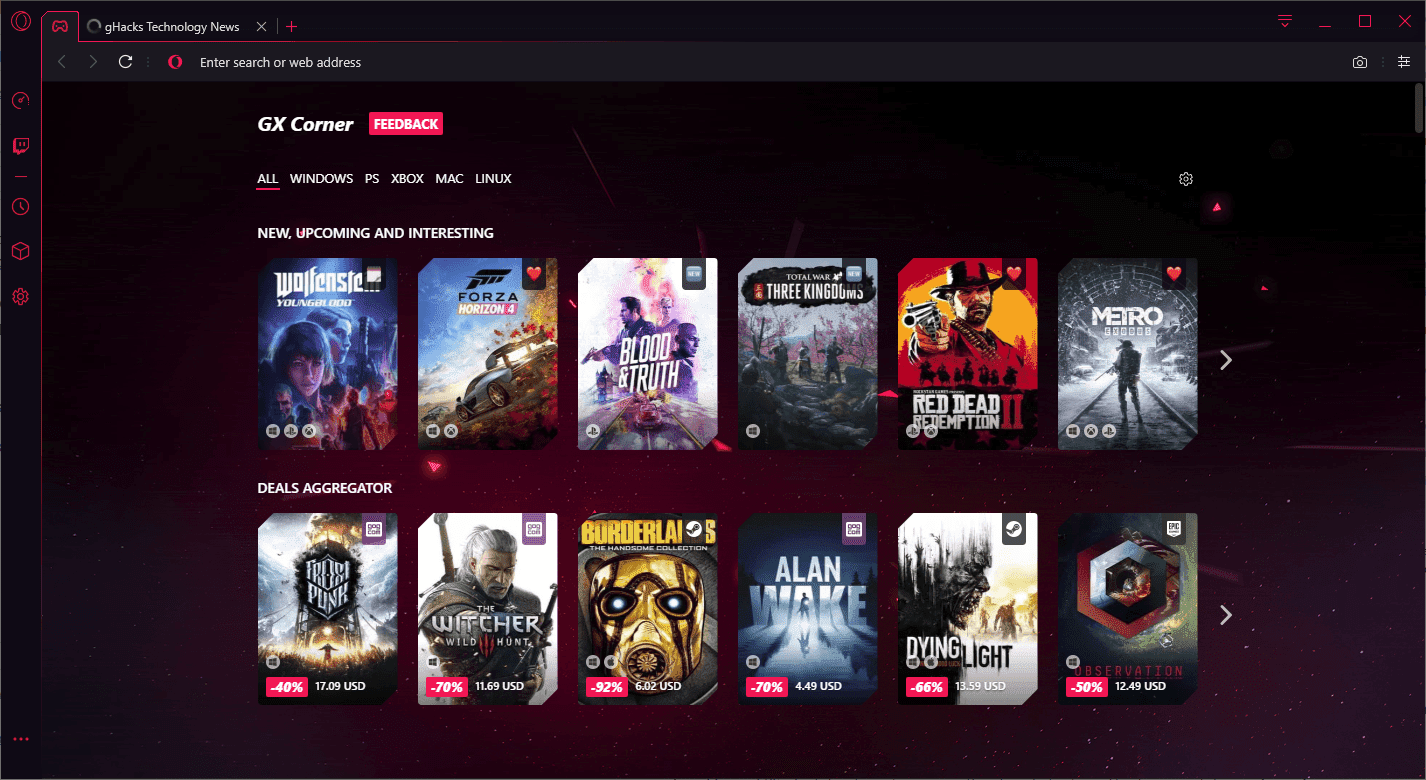
On 16 December 2010, Opera 11 was released, featuring extensions, tab stacking (where dragging one tab over another allowed creating a group of tabs), visual mouse gestures and changes to the address bar. According to Opera Software, it made Opera 10.50 more than seven times faster in SunSpider than Opera 10.10. Ī new JavaScript engine, called Carakan (after the Javanese alphabet), was introduced with version 10.50.
#OPERA GX FOR LINUX SOFTWARE#
In 2006, Opera Software ASA was released as well as Nintendo DS Browser and Internet Channel for Nintendo's DS and Wii gaming systems, respectively, which were Opera-based browsers. This feature was further expanded in version 9.5, when GeoTrust was replaced with Netcraft, and malware protection from Haute Secure was added. Īmong new features introduced in version 9.1, released in 2006, was fraud protection using technology from GeoTrust, a digital certificate provider, and PhishTank, an organization that tracks known phishing web sites. With version 8.5, released in 2005, the ads were completely removed, and the browser's primary financial support came through revenue from Google (by contract, Opera's default search engine). Subsequent versions have given users the choice of seeing banner ads or targeted text ads from Google. With version 5.0, released in 2000, Opera became ad-sponsored, displaying ads to users who had not paid for it.
#OPERA GX FOR LINUX TRIAL#
To this point, Opera was trialware and had to be purchased after the trial period. Opera 4.0, released in 2000, included a new cross-platform core that facilitated the creation of editions of Opera for multiple operating systems and platforms. Development for mobile device platforms started in 1998.
#OPERA GX FOR LINUX WINDOWS#
Opera was initially released on 10 April 1995, and then it was released publicly in 1996 with version 2.10, which ran on Microsoft Windows 95. In 1994, Jon Stephenson von Tetzchner and Geir Ivarsøy started developing the Opera web browser while working at Telenor, a Norwegian telecommunications company. Main article: History of the Opera web browser In April 2023, the company announced a major overhaul to the browser, called Opera 100 and codenamed "Opera One", adding a new user interface and several AI-related features, Opera 100 was released on June 20, 2023. The company released a gaming-oriented version of the browser, Opera GX, in 2019, and a blockchain-focused Opera Crypto Browser into public beta in January 2022. In 2016, Opera was acquired by an investment group led by a Chinese consortium. Opera users also have access to Opera News, a news app based on an AI platform. There are also mobile versions called Opera Mobile and Opera Mini. Opera is available on Windows, macOS, Linux, Android, and iOS (Safari WebKit engine). In 2013, it switched from the Presto engine to Chromium. It was commercial software for its first ten years and had its own proprietary layout engine, Presto. Opera was initially released on 10 April 1995, making it one of the oldest desktop web browsers still actively developed. The browser is based on Chromium, but distinguishes itself from other Chromium-based browsers ( Chrome, Edge, etc.) through its user interface and other features. Opera is a multi-platform web browser developed by its namesake company Opera. (Formerly FreeBSD, Nintendo Wii, Nintendo DS, and Nintendo DS Lite) If you see inaccuracies in our content, please report the mistake via this form./ 23 August 2023 7 days ago ( 23 August 2023)ġ.6 (August 8, 2023 22 days ago ( ) )ġ.0 (August 7, 2023 23 days ago ( ) ) If we have made an error or published misleading information, we will correct or clarify the article. Our editors thoroughly review and fact-check every article to ensure that our content meets the highest standards.

Our goal is to deliver the most accurate information and the most knowledgeable advice possible in order to help you make smarter buying decisions on tech gear and a wide array of products and services. ZDNET's editorial team writes on behalf of you, our reader. Indeed, we follow strict guidelines that ensure our editorial content is never influenced by advertisers. Neither ZDNET nor the author are compensated for these independent reviews. This helps support our work, but does not affect what we cover or how, and it does not affect the price you pay. When you click through from our site to a retailer and buy a product or service, we may earn affiliate commissions. And we pore over customer reviews to find out what matters to real people who already own and use the products and services we’re assessing.
We gather data from the best available sources, including vendor and retailer listings as well as other relevant and independent reviews sites. ZDNET's recommendations are based on many hours of testing, research, and comparison shopping.


 0 kommentar(er)
0 kommentar(er)
